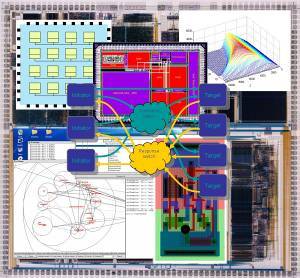
Building a Common Vision for the UK Microelectronic Design Research Community
Background
The UK has an active research community in microelectronic design comprising many diverse groups working on projects ranging from novel bio-inspired circuits through to complex systems-on-chip, from high-level behavioural synthesis tools to low-level analogue circuit techniques. Much of this work is world-class and highly innovative, but the programme as a whole suffers from limited visibility at national level and lacks coherency.
The objective of this initiative is to bring the community together to agree a common long-term vision for the future of microelectronic design research in the UK, and to develop some overarching themes that we agree form a useful way of thinking about the directions we want to take in the future. These themes should be broad enough to encompass a wide range of activity, but coherent enough to present a persuasive picture of the value of the research that we undertake. They should be usable by funding agencies to convince government that the work that they fund in this area is truly world-class and makes an effective contribution to the UK economy and quality of life.
Programme
The planned stages for the development and ongoing maintenance of the common vision are:
- Written ‘vision statements’ are solicited for long-term microelectronic design research objectives (see guidelines below) .
- A one-day workshop will be held at the IEE, Savoy Place, London on November 15 2004, from 2 to 5pm, where the vision statements will be refined and grouped into coherent themes. The workshop will run alongside the 1 st IEE EDA Tools Forum which takes place on November 16-17 (http://conferences.iee.org/eda/).
- We will continue with a series of annual workshops to further refine and introduce new objectives so that the vision continues to evolve and respond to new ideas.
Scope
Within this programme the phrase ‘microelectronic design research’ is taken to include:
- complex SoC design
- design tools for complex SoCs
- novel chip design – analogue, neural, bio-inspired, reconfigurable, evolvable, probabilistic, chip multiprocessors, …
- mixed signal, integrated sensors, RF – as parts of complex systems The overriding theme is of design complexity, and tools and schemes for coping with design complexity, in the microelectronic domain. It does not include issues relating primarily to physics or materials, such as electronic, photonic or novel devices, device modelling or RF propagation, nor does it extend into the computing domain to included issues such as high-performance computing, big software and e-Science, though there may be overlapping interests.
Related initiatives
- The common vision programme will operate under the auspices of the IEE “Microelectronics and Embedded Systems” Professional Network chaired by Professor Roger Woods.
- The programme complements the industry-led UKpsi initiative whose objectives it supports.
- This programme borrows unashamedly from the UKCRC ‘Grand Challenge’ initiative which has resulted in a significantly enhanced long-term vision for computer science research.
Vision statement guidelines
Outline vision statements are invited for common themes for long-term research in microelectronic design. Radical ideas are very welcome. The themes should be broad and inclusive rather than narrow, thus for example “bio-inspired novel computation architectures” works better than “a neural FPGA”.
Vision statements should address the following issues:
Format
• Vision statements should be no more than a couple of A4 pages in length.
Significance
- Does the proposed research result in outputs that will have a far-reaching impact on academic research and/or industry?
- Are there clear criteria against which the success or failure of the research can ultimately be measured?
- Would the proposed research command widespread support from the microelectronic research community?
- Would it appeal to the imagination of the general public?
- What benefits might accrue to academia, industry or society?
Scale
- Does the proposed research have international scope?
- Can it be split into smaller projects with identifiable shorter-term goals?
- Is there a strong multidisciplinary aspect that could encourage collaboration between diverse groups?
Timeliness
- Are the objectives achievable within a 10 to 20 year timescale?
- Why is it feasible to start to address these objectives now?
- What are the risks and contingency plans for addressing those risks?
Vision statements should be sent by email to steve.furber@manchester.ac.uk by November 10 2004 (and preferably sooner!). Queries regarding the process should also be addressed to Steve.
Workshop
The first workshop, held at the IEE in London on November 15 2004, will meet to review the written vision statements, group them into coherent themes, and then to initiate the process of developing unified descriptions of those themes. Please email steve.furber@manchester.ac.uk if you wish to attend the workshop. Submitting a written vision statement is not a prerequisite for, nor does it commit you to, attending the workshop.
Organising Committee
The following have offered support for this initiative and will contribute to taking it forward: Steve Beaumont (ISLI), John McCanny (QUB), Steve Furber (Manchester), Roger Woods (QUB), Andrew Brown (Southampton), Alan Murray (Edinburgh), Andy Tyrrell (York).

